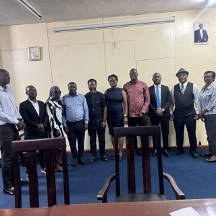IMF Executive Board Approves Extension of ECF For Sierra Leone By 5 Months
IMF Executive Board Approves Extension of ECF For Sierra Leone By 5 Months
IMF Executive Board Approves Extension of ECF For Sierra Leone By 5 Months
The IMF Executive Board completed the sixth and seventh reviews under the Extended Credit Facility Arrangement for Sierra Leone, which allows for an immediate disbursement of about US$20.7 million.
Sierra Leone’s economic challenges have intensified. Inflation has continued to rise; the currency has depreciated sharply; and debt related risks have increased. The authorities have requested an extension of the program to November 2023 to continue to build on recent reforms and achieve program objectives.
Building resilience and laying the foundations for stronger growth by consolidating public finances and addressing debt vulnerabilities, while supporting the most vulnerable, remains key to the success of the program.
Washington, DC: The Executive Board of the International Monetary Fund (IMF) completed the Sixth and Seventh Reviews of Sierra Leone’s Extended Credit Facility (ECF) arrangement, and approved the authorities’ request for a rephasing, and extension of the ECF Arrangement by five months to November 29, 2023. The completion of the reviews enables the immediate disbursement of SDR 15.555 million (about US$20.7 million). This brings the total disbursements under the ECF Arrangement to SDR 108.89 million (about US$144.6 million).
In completing the sixth and seventh reviews, the Executive Board approved the authorities’ request for waivers for nonobservance of the end-June 2022 performance criterion on the ceiling on the net domestic bank credit to the central government, and the end-December 2022 performance criteria on the ceiling on the net domestic bank credit to the central government, the ceiling on the net domestic assets of the BSL, and the floor on the gross international reserves of the BSL, based on corrective actions taken by the authorities.
The ECF Arrangement with Sierra Leone was approved by the Executive Board on November 30, 2018, for SDR 124.44 million (about US$172.1 million at that time or around 60 percent of the country’s quota) for 43 months, and was further extended by 12 months on July 27, 2021. The program aims to reduce inflation, mobilize revenue to allow for necessary spending consistent with debt sustainability, safeguard financial stability, and maintain external resilience to shock.
The economic recovery from successive external shocks was interrupted last year, amid high energy and food prices in the context of Russia’s war in Ukraine, reduced household purchasing power and lower than expected mining output. Inflation continued to rise on the back of increasing commodity prices, as well as looser-than-warranted macroeconomic policies and the sharp currency depreciation. The soaring cost of living contributed to rising levels of food insecurity. Foreign exchange reserves remain adequate but have declined, and rebuilding reserve buffers will be a priority going forward. Sierra Leone remains at high risk of debt distress, and risks have risen in the context of recent large fiscal deficits and the currency depreciation. A frontloaded and decisive adjustment of macroeconomic policies is needed to restore stability, create space for priority social spending, and contain risks to debt sustainability.
Macroeconomic conditions are expected to stabilize on the back of the planned adjustment, but the outlook remains challenging. Growth is expected to decelerate to 2.7 percent in 2023 from 3.6 percent in 2022, before recovering to 4.7 percent in 2024. Inflation is projected to gradually decline to single digits over the medium term amid the contractionary policy stance, while foreign exchange reserves would stabilize, assuming robust concessional financing.
Policy implementation risks are high amid the large adjustment need. A larger-than-programmed domestic financing need, and further deposit dollarization, could intensify rollover risks, as banks’ ability to increase holdings of government paper could come under strain. Larger-than-programmed BSL purchases of government paper would further spur the inflation-depreciation spiral, thus reigniting deposit dollarization. An abrupt global slowdown, tighter global financial conditions, a more protracted Russia’s war in Ukraine, and geographical fragmentation could weigh on external demand. A worse-than-anticipated terms of trade shock, and higher inflation, could deteriorate fiscal and external accounts.
At the conclusion of the Executive Board’s discussion, Mr. Bo Li, Deputy Managing Director, and Acting Chair, made the following statement:
“Sierra Leone continues to face significant economic challenges, amplified by multiple shocks, including from Russia’s war in Ukraine and policy slippages. Inflation continued to rise, the currency depreciated sharply, and debt related risks increased. A decisive and frontloaded tightening of macroeconomic policies is required to restore stability and contain increasing risks to debt sustainability. The authorities have started taking bold measures to stabilize the economy, with the ECF program remaining an important policy anchor amid a fragile economic backdrop.
Recent efforts to bolster tax revenues represent important steps towards tightening the fiscal stance, while creating space for priority social spending. The implementation of the new Medium-Term Revenue Strategy will further strengthen revenue mobilization. Efforts to raise revenues and curtail spending need to be backed by contingency measures, given the large adjustment need. Strengthening budget preparation and execution will be crucial in achieving a durable fiscal adjustment. High risks to debt sustainability imply that efforts are needed to bring down the debt service burden, while mobilizing additional grant support.
To bring down inflation and arrest the currency depreciation, monetary conditions need to tighten, including through reduced central bank purchases of government securities. Exchange rate policy should focus on rebuilding foreign exchange reserves. Reinforcing transparency in the currency redenomination will boost confidence in the currency.
Ensuring financial sector stability will require building on recent progress in improving bank supervision and regulation, while strengthening the financial sector safety net and crisis management frameworks. Time-bound action vis-à-vis banks in breach of regulatory requirements is key. Further efforts to strengthen the AML/CFT framework are needed.
Structural reforms will be essential to reduce vulnerabilities to corruption and foster private sector development.





